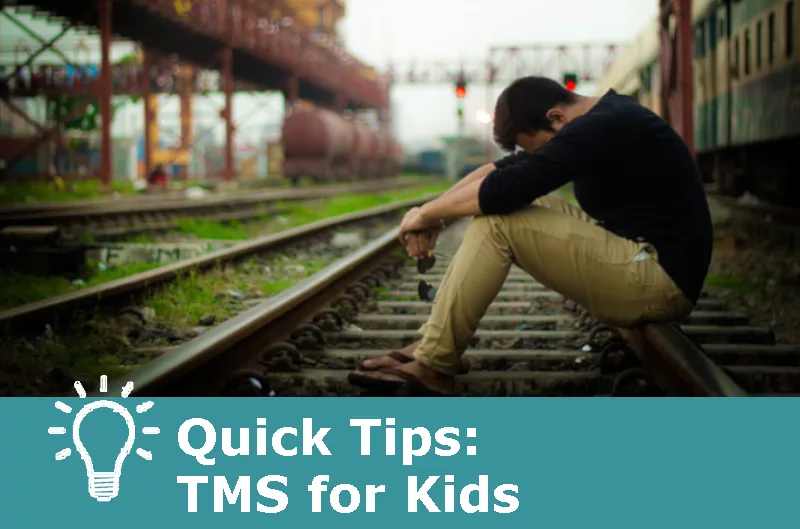There’s been some promising research for Transcranial Magnetic Stimulation (TMS), but can it be used for treatment-resistant depression in children and adolescents? Here’s a summary of the pros and cons presented in this 2019 article in The Carlat Child Psychiatry Report.
Pros:
It seems to work. An open-label trial of TMS for adolescents found a 44% remission rate for kids ages 13-21 years old with Treatment-Resistant Depression. The treatment period was 3 weeks, and even though it’s the largest study we have, it only covered 32 individuals. (MacMaster FP et al, Front Psychiatry 2019;10(article 170);1–6).
It’s generally safe. A meta-analysis found side effects of TMS treatment were mild and transient. The most frequently reported side effects were headaches (11.5%), scalp discomfort (2.5%), and twitching (1.2%). Again we could use more research, this data came from 48 studies involving 513 participants within the age range of 2.5-17.8 years old. (Krishnan et al, Brain Stimulation 2015;8(1):76–87).
Won’t affect school work. Preliminary findings in older adolescents found that TMS doesn’t have negative effects on cognition. In fact, some evidence suggests that TMS may modestly improve verbal memory in older adolescents (Wall CA et al, Front Psychiatry 2013;4(article 165):1–8).
Cons:
It’s off-label. TMS is not FDA-approved for depression in children and adolescents. A standardized TMS treatment protocol has not been established yet.
Unknown long-term effects. Studies are limited and recent. We don’t know if TMS has long-term damaging effects on the developing brain.
Not enough research. It’s challenging to provide reasonable informed consent to patients.
It's relatively expensive. Since each TMS session costs approximately $300-$500, a treatment regimen of 5 sessions per week for the first 4-6 weeks can reach a grand total anywhere from $6,000 to $15,000.
Bottom Line:
Fluoxetine and CBT have the research behind them to be considered first-line treatments for depression in kids. However, when those treatments aren’t working and patients are still suffering, TMS might be a useful option.
Want to learn more? Subscribers can read the full article here.
Pros:
It seems to work. An open-label trial of TMS for adolescents found a 44% remission rate for kids ages 13-21 years old with Treatment-Resistant Depression. The treatment period was 3 weeks, and even though it’s the largest study we have, it only covered 32 individuals. (MacMaster FP et al, Front Psychiatry 2019;10(article 170);1–6).
It’s generally safe. A meta-analysis found side effects of TMS treatment were mild and transient. The most frequently reported side effects were headaches (11.5%), scalp discomfort (2.5%), and twitching (1.2%). Again we could use more research, this data came from 48 studies involving 513 participants within the age range of 2.5-17.8 years old. (Krishnan et al, Brain Stimulation 2015;8(1):76–87).
Won’t affect school work. Preliminary findings in older adolescents found that TMS doesn’t have negative effects on cognition. In fact, some evidence suggests that TMS may modestly improve verbal memory in older adolescents (Wall CA et al, Front Psychiatry 2013;4(article 165):1–8).
Cons:
It’s off-label. TMS is not FDA-approved for depression in children and adolescents. A standardized TMS treatment protocol has not been established yet.
Unknown long-term effects. Studies are limited and recent. We don’t know if TMS has long-term damaging effects on the developing brain.
Not enough research. It’s challenging to provide reasonable informed consent to patients.
It's relatively expensive. Since each TMS session costs approximately $300-$500, a treatment regimen of 5 sessions per week for the first 4-6 weeks can reach a grand total anywhere from $6,000 to $15,000.
Bottom Line:
Fluoxetine and CBT have the research behind them to be considered first-line treatments for depression in kids. However, when those treatments aren’t working and patients are still suffering, TMS might be a useful option.
Want to learn more? Subscribers can read the full article here.


_-The-Breakthrough-Antipsychotic-That-Could-Change-Everything.webp?t=1729528747)



